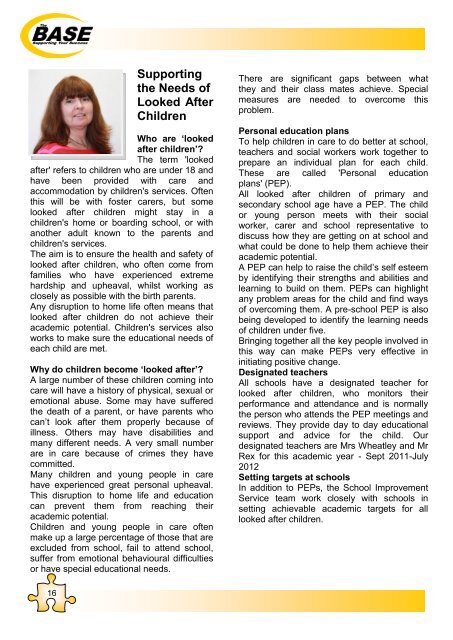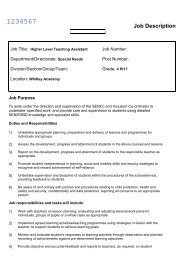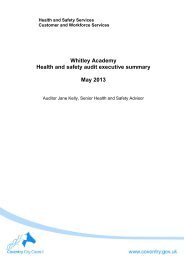Please download our full brochure for more ... - Whitley Academy
Please download our full brochure for more ... - Whitley Academy
Please download our full brochure for more ... - Whitley Academy
Create successful ePaper yourself
Turn your PDF publications into a flip-book with our unique Google optimized e-Paper software.
Supporting<br />
the Needs of<br />
Looked After<br />
Children<br />
Who are ‘looked<br />
after children’<br />
The term 'looked<br />
after' refers to children who are under 18 and<br />
have been provided with care and<br />
accommodation by children's services. Often<br />
this will be with foster carers, but some<br />
looked after children might stay in a<br />
children's home or boarding school, or with<br />
another adult known to the parents and<br />
children's services.<br />
The aim is to ensure the health and safety of<br />
looked after children, who often come from<br />
families who have experienced extreme<br />
hardship and upheaval, whilst working as<br />
closely as possible with the birth parents.<br />
Any disruption to home life often means that<br />
looked after children do not achieve their<br />
academic potential. Children's services also<br />
works to make sure the educational needs of<br />
each child are met.<br />
Why do children become ‘looked after’<br />
A large number of these children coming into<br />
care will have a history of physical, sexual or<br />
emotional abuse. Some may have suffered<br />
the death of a parent, or have parents who<br />
can’t look after them properly because of<br />
illness. Others may have disabilities and<br />
many different needs. A very small number<br />
are in care because of crimes they have<br />
committed.<br />
Many children and young people in care<br />
have experienced great personal upheaval.<br />
This disruption to home life and education<br />
can prevent them from reaching their<br />
academic potential.<br />
Children and young people in care often<br />
make up a large percentage of those that are<br />
excluded from school, fail to attend school,<br />
suffer from emotional behavi<strong>our</strong>al difficulties<br />
or have special educational needs.<br />
There are significant gaps between what<br />
they and their class mates achieve. Special<br />
measures are needed to overcome this<br />
problem.<br />
Personal education plans<br />
To help children in care to do better at school,<br />
teachers and social workers work together to<br />
prepare an individual plan <strong>for</strong> each child.<br />
These are called 'Personal education<br />
plans' (PEP).<br />
All looked after children of primary and<br />
secondary school age have a PEP. The child<br />
or young person meets with their social<br />
worker, carer and school representative to<br />
discuss how they are getting on at school and<br />
what could be done to help them achieve their<br />
academic potential.<br />
A PEP can help to raise the child’s self esteem<br />
by identifying their strengths and abilities and<br />
learning to build on them. PEPs can highlight<br />
any problem areas <strong>for</strong> the child and find ways<br />
of overcoming them. A pre-school PEP is also<br />
being developed to identify the learning needs<br />
of children under five.<br />
Bringing together all the key people involved in<br />
this way can make PEPs very effective in<br />
initiating positive change.<br />
Designated teachers<br />
All schools have a designated teacher <strong>for</strong><br />
looked after children, who monitors their<br />
per<strong>for</strong>mance and attendance and is normally<br />
the person who attends the PEP meetings and<br />
reviews. They provide day to day educational<br />
support and advice <strong>for</strong> the child. Our<br />
designated teachers are Mrs Wheatley and Mr<br />
Rex <strong>for</strong> this academic year - Sept 2011-July<br />
2012<br />
Setting targets at schools<br />
In addition to PEPs, the School Improvement<br />
Service team work closely with schools in<br />
setting achievable academic targets <strong>for</strong> all<br />
looked after children.<br />
16














